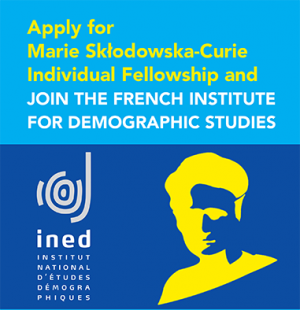Jenny Garcia and Gaëlle Meslay
Jenny Garcia and Gaëlle Meslay, each recently awarded a Marie Skłodowska-Curie post-doctoral grant, answered questions on their research work.
(Interview conducted in July 2022)
What made you apply for a Marie Skłodowska-Curie? Did you each have a specific research project in mind? And what was the application process?
- Jenny Garcia – While working on my doctoral thesis on mortality in Latin America, I became interested in the demographics of the humanitarian crisis in Venezuela. I wanted to continue doing research in these areas, so I applied for a Marie Skłodowska-Curie post-doctoral grant to work at the Johns Hopkins University Center for Humanitarian Health, jointly conducted by the Bloomberg School of Public Health. The grant will enable me to pursue my research for two years at this US institution, followed by an additional year at INED.
- Gaëlle Meslay – Work on my doctoral thesis on same-sex marriages brought to light issues around parenthood that I would like to study in greater detail. So, after defending my thesis, I applied via INED for a Marie Skłodowska-Curie post-doctoral grant for my specific research project. I indicated where I wanted to do the research: the University of Austin, Texas, where my thesis mentor works. I’d already discussed my project him and he’d agreed to supervise my work. Thanks to the grant I’ll be working in Austin for two years (I’m already here), followed by a year of research at INED.
What research will you be doing in the United States?
- Jenny Garcia – My work is on the demographic impacts of humanitarian crises in Latin America, and I’ll be using the example of the crisis in Venezuela. Doing population studies during crises is a real challenge as there is not much in the way of high-quality data. These crises have impacts that extend beyond nation-state borders. So, since there is little or no data available on the Venezuelan population since 2017, I’ll be drawing on surveys and on the civil registers of neighboring countries to establish population, fertility, and mortality estimates on Venezuela residents and the Venezuelan diaspora in Latin America.
- Gaëlle Meslay – My research is on accessibility (and inaccessibility) to parenthood for LGBTQ persons. I’m doing both a generational comparison and a comparison of two countries— France and the United States—as well as states within the US, studying differences between their reproduction assistance policies and the impacts of those policies on LGBTQ parenthood projects. I wanted to do my research in the US because there have already been many surveys on the subject there, and a substantial number of research studies.
What differences do you see between doing research in the United States and in France?
- Jenny Garcia – In the school that’s hosting me, researchers tend to work in teams on circumscribed research projects. Being part of a large university campus means greater diversity of jobs, resources, and offers.
- Gaëlle Meslay – Surveys conducted in the US are wide-ranging and depend on quite substantial resources. They’re funded differently—by major public institutes, such as public health institutes.
American research articles follow a tighter structure, and they use a more direct style to communicate information on methods and findings. In the Texas research laboratory where I’m working, we meet every week, collectively and individually, with our supervisor to report on research progress.
What do you think the grant will bring you in the future? What are you thinking of doing after your stays in the United States and at INED?
- Jenny Garcia – With everything I’ll being learning from this experience, I’d like to continue doing research projects, to apply for other grants and for researcher positions.
- Gaëlle Meslay – For me the purpose of this grant is to develop new approaches and improve my profile in applying for research positions. I’d like to apply for researcher jobs in France, at the CNRS or INED, and university positions. It’s really useful to see firsthand how research is done internationally, survey conducting and article writing, and it gives you ideas for future studies. I’d like to come back and develop these types of methods in France or Europe.

